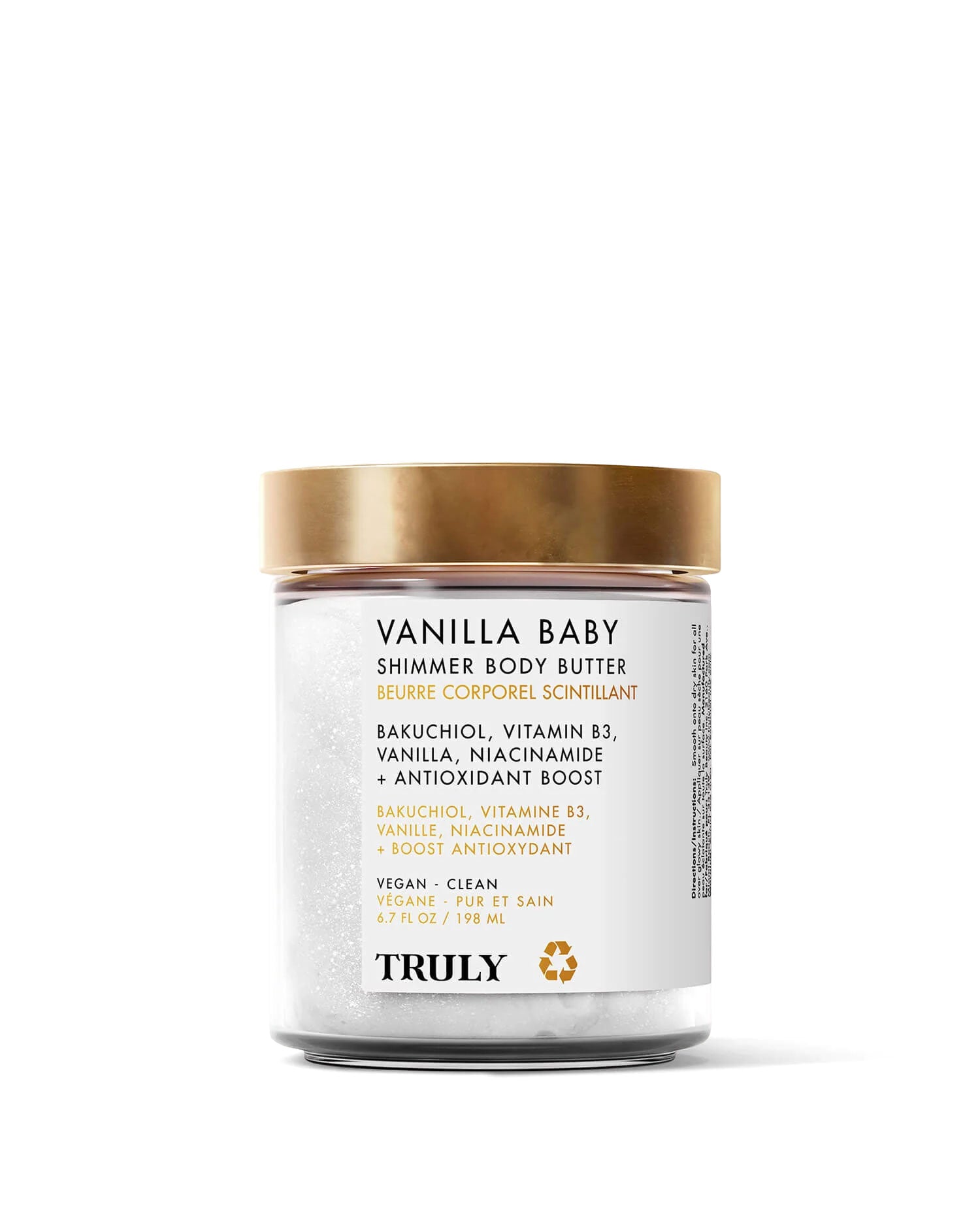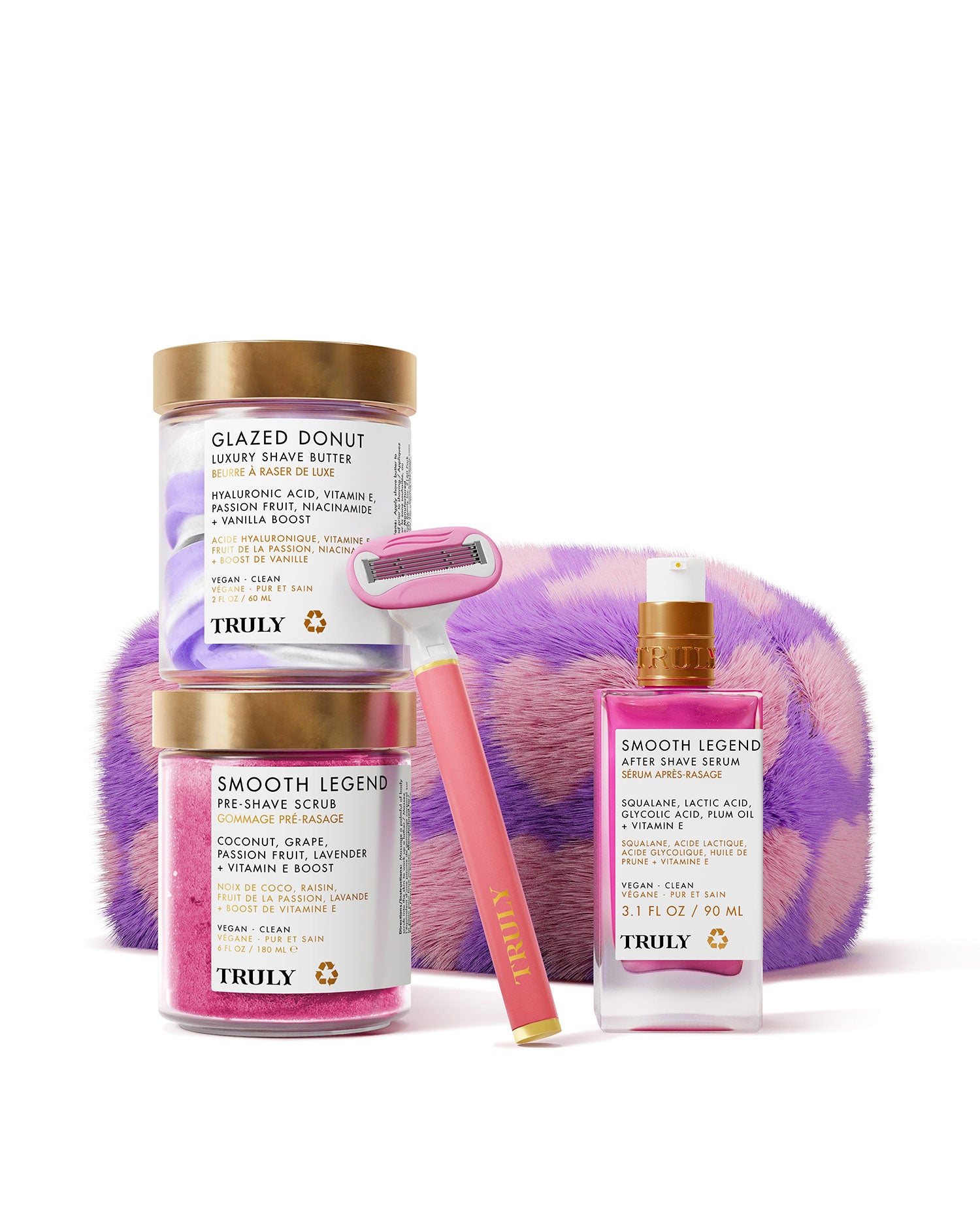Cold Shower vs Hot Shower: Which is Better For Your Skin?
January 07, 2026
By: Truly Beauty
Like your shower steamy? Sadly, you may need to give those hot showers a miss if you want healthy skin.
- Cold shower vs hot shower for skin: Experts say lukewarm showers are best for skin health, as hot water strips protective natural oils, leading to dryness and irritation. You can combat post-shower dryness and flaking with a hydrating, barrier-supporting moisturizer like Truly's Vanilla Baby Body Butter.
That being said, there are pros and cons to both. Let's take a look at which is better out of cold showers or hot showers.
Recommended Post-Shower Products
Cold Shower vs Hot Shower for Skin
When comparing a cold shower vs hot shower, the effects on your skin depend on temperature, duration, and your individual skin type. Both offer unique benefits but each also comes with drawbacks that can impact skin health over time.
Benefits of Cold Showers for Skin
- Tightens pores, giving the skin a smoother appearance.
- Helps calm redness and inflammation, making it beneficial for sensitive or acne-prone skin.
- Gentle on the skin barrier, especially compared to hot water exposure.
- Prevents excessive dryness by preserving natural oils.
- Can boost circulation, giving skin a temporary healthy glow.
- May help reduce puffiness, particularly around the face and eyes.
Cons of Cold Showers for Skin
- May aggravate chronic skin conditions like eczema or psoriasis in some individuals.
- Less effective at removing oils, dirt, sunscreen, and product buildup, which can lead to clogged pores.
Benefits of Hot Showers for Skin
- Opens pores, allowing for deeper cleansing and easier removal of dirt, oil, and makeup.
- Helps soften dead skin cells, making exfoliation and shaving more effective.
- Can relax facial and body muscles, which may support better sleep and stress reduction.
- Improves temporary blood flow, giving skin a flushed appearance.
Cons of Hot Showers for Skin
- Strips natural oils, leading to dryness and dehydration.
- Can damage the skin barrier, increasing sensitivity and irritation.
- May worsen skin conditions such as acne, rosacea, eczema, or psoriasis.
- Prolonged hot showers can cause itching, redness, and flakiness.
- Frequent exposure may accelerate moisture loss, making skin appear dull or aged over time.
Which Is Better for Skin: Cold Shower or Hot Shower?
For most people, lukewarm water offers the best balance. If choosing between a cold shower vs hot shower, dermatologists generally recommend: Cold or cool showers for sensitive, dry skin and warm (not hot) showers for cleansing, followed by a cool rinse.
FAQ: Hot Showers vs Cold Showers
It's time to answer those pressing shower-related questions!
Are Cold Showers Better for Acne-Prone Skin?
Cold showers can be helpful for acne-prone skin because they reduce inflammation and redness. Cooler water also helps preserve the skin’s natural oils, which may prevent the overproduction of sebum.
However, cold water alone won’t cleanse pores deeply. For acne-prone skin, the best approach is to cleanse with lukewarm water, then finish with cool water to calm the skin and minimize irritation.
Can Hot Showers Make Dry Skin Worse?
Yes. Hot showers are one of the most common causes of dry, itchy skin. High temperatures strip away the skin’s protective oils, weaken the skin barrier, and increase moisture loss.
If you already have dry skin, switch to short, lukewarm showers and moisturize immediately afterward with Truly's hyaluronic acid-infused Birthday Sex Body Butter.
How Long Should You Shower for Healthy Skin?
Dermatologists generally recommend keeping showers between 5 and 10 minutes. Longer showers can increase dryness and irritation by removing too much of the skin’s natural moisture.
As soon as you finish, apply a generous layer of moisturizer like Truly's Vanilla Baby Body Butter.
Does Cold Water Really Shrink Pores?
It can. Cold water causes blood vessels to constrict, which can make pores appear smaller and reduce puffiness. The result is smoother-looking skin and improved circulation for a healthy glow.
To minimize pores even further, use a salicylic acid exfoliator like Truly's 24K Gold Black Soap Cleanser.
Why Does Skin Get Blotchy After a Hot Shower?
Warm water can cause changes in blood circulation in the body, causing skin color to change in response to less blood flow. That's just one of the reasons you might be getting blotchy skin after a shower.
It could also be contact dermatitis or eczema - as these flare up when exposed to heat. That blotchy skin may even be a heat rash, a skin rash caused by contact with excessive heat.
Does Hot Water Really Help Shaving?
Yes, warm water opens and cleans the pores, relaxes the skin, and softens the hair. Add in a nourishing shaving cream and you've got yourself the perfect shave!
Can Showering in Cold Water Really Help You Lose Weight?
Some studies show it can. That's because fat cells, including brown fat, can generate heat by burning body fat. This happens when your body is exposed to cold conditions. Unlike white fat cells, brown fat cells maintain your body temperature by burning calories to generate heat.
Is It Better to Shower in the Morning or at Night for Skin Health?
Both can be beneficial. Morning showers help remove sweat and oil buildup from overnight and can reduce morning puffiness, especially when finished with cool water. Evening showers, on the other hand, wash away dirt, pollution, sunscreen, and makeup accumulated throughout the day.
Whether you have a cold or hot shower, it's always important to follow up with a body lotion as soon as you hop out the shower to lock in moisture and support skin barrier health. Need a new or better moisturizer? Choose from our bestselling body treatments for all-day dewy hydration.
In this article
-
Cold Shower vs Hot Shower: Which is Better For Your Skin?
-
Recommended Post-Shower Products
-
Cold Shower vs Hot Shower for Skin
-
Which Is Better for Skin: Cold Shower or Hot Shower?
-
FAQ: Hot Showers vs Cold Showers
-
Are Cold Showers Better for Acne-Prone Skin?
-
Can Hot Showers Make Dry Skin Worse?
-
How Long Should You Shower for Healthy Skin?
-
Does Cold Water Really Shrink Pores?
-
Why Does Skin Get Blotchy After a Hot Shower?
-
Does Hot Water Really Help Shaving?
-
Can Showering in Cold Water Really Help You Lose Weight?
-
Is It Better to Shower in the Morning or at Night for Skin Health?
-
Are Cold Showers Better for Acne-Prone Skin?





























